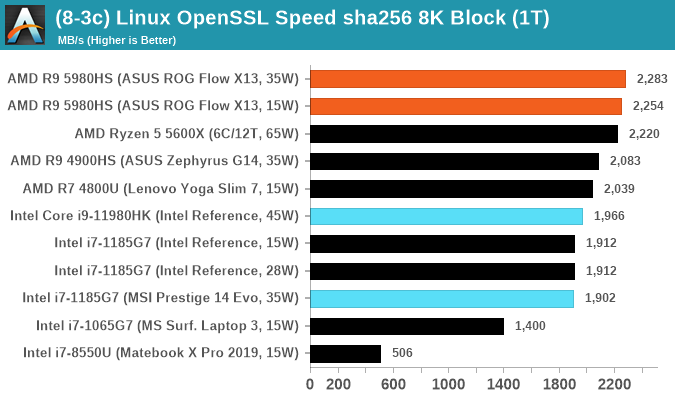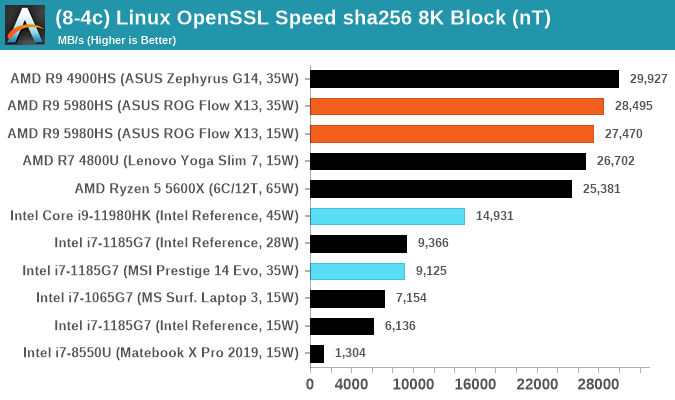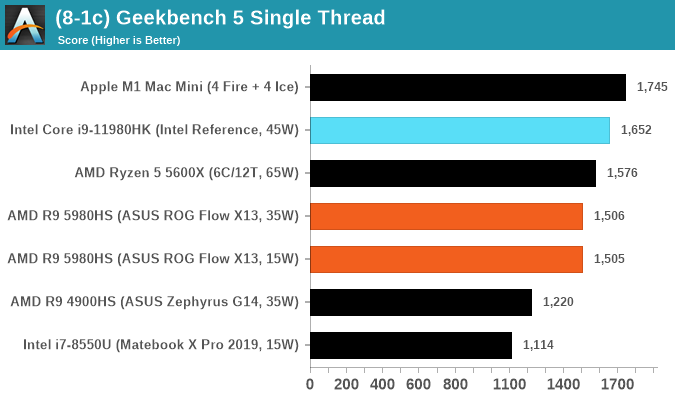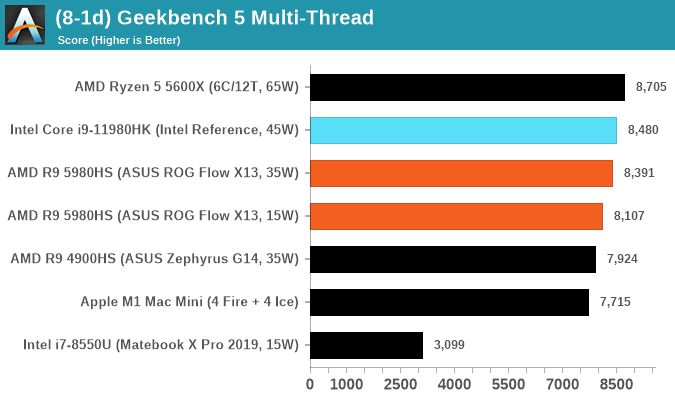Intel 11th Generation Core Tiger Lake-H Performance Review: Fast and Power Hungry
by Brett Howse & Andrei Frumusanu on May 17, 2021 9:00 AM EST- Posted in
- CPUs
- Intel
- 10nm
- Willow Cove
- SuperFin
- 11th Gen
- Tiger Lake-H
CPU Tests: Synthetic
Most of the people in our industry have a love/hate relationship when it comes to synthetic tests. On the one hand, they’re often good for quick summaries of performance and are easy to use, but most of the time the tests aren’t related to any real software. Synthetic tests are often very good at burrowing down to a specific set of instructions and maximizing the performance out of those. Due to requests from a number of our readers, we have the following synthetic tests.
Linux OpenSSL Speed: SHA256
One of our readers reached out in early 2020 and stated that he was interested in looking at OpenSSL hashing rates in Linux. Luckily OpenSSL in Linux has a function called ‘speed’ that allows the user to determine how fast the system is for any given hashing algorithm, as well as signing and verifying messages.
OpenSSL offers a lot of algorithms to choose from, and based on a quick Twitter poll, we narrowed it down to the following:
- rsa2048 sign and rsa2048 verify
- sha256 at 8K block size
- md5 at 8K block size
For each of these tests, we run them in single thread and multithreaded mode. All the graphs are in our benchmark database, Bench, and we use the sha256 results in published reviews.


GeekBench 5: Link
As a common tool for cross-platform testing between mobile, PC, and Mac, GeekBench is an ultimate exercise in synthetic testing across a range of algorithms looking for peak throughput. Tests include encryption, compression, fast Fourier transform, memory operations, n-body physics, matrix operations, histogram manipulation, and HTML parsing.
Unfortunately we are not going to include the Intel GB5 results in this review, although you can find them inside our benchmark database. The reason behind this is down to AVX512 acceleration of GB5's AES test - this causes a substantial performance difference in single threaded workloads that thus sub-test completely skews any of Intel's results to the point of literal absurdity. AES is not that important of a real-world workload, so the fact that it obscures the rest of GB5's subtests makes overall score comparisons to Intel CPUs with AVX512 installed irrelevant to draw any conclusions. This is also important for future comparisons of Intel CPUs, such as Rocket Lake, which will have AVX512 installed. Users should ask to see the sub-test scores, or a version of GB5 where the AES test is removed.


To clarify the point on AES. The Core i9-10900K scores 1878 in the AES test, while 1185G7 scores 4149. While we're not necessarily against the use of accelerators especially given that the future is going to be based on how many and how efficient these accelerators work (we can argue whether AVX-512 is efficient compared to dedicated silicon), the issue stems from a combi-test like GeekBench in which it condenses several different (around 20) tests into a single number from which conclusions are meant to be drawn. If one test gets accelerated enough to skew the end result, then rather than being a representation of a set of tests, that one single test becomes the conclusion at the behest of the others, and it's at that point the test should be removed and put on its own. GeekBench 4 had memory tests that were removed for Geekbench 5 for similar reasons, and should there be a sixth GeekBench iteraction, our recommendation is that the cryptography is removed for similar reasons. There are 100s of cryptography algorithms to optimize for, but in the event where a popular tests focuses on a single algorithm, that then becomes an optimization target and becomes meaningless when the broader ecosystem overwhelmingly uses other cryptography algorithms.










229 Comments
View All Comments
mode_13h - Tuesday, May 18, 2021 - link
It's now royalty-free and completely intertwined with USB4. So, no... it's not going away.drothgery - Monday, May 17, 2021 - link
This presumes anything resembling parity in both availability and quality of the laptops the CPUs are in which historically has ... not been the case.eastcoast_pete - Monday, May 17, 2021 - link
Unfortunately, it's more "..if you can get.." rather than "..when you can get an AMD alternative".Azix - Monday, May 17, 2021 - link
power draw on a laptop is always going to be paired with battery capacity. It's about battery life right? Or maybe its about the heat on the bottom of the laptop.End of the day its mostly down to laptop design. The power consumption is likely to be transparent to the end user.
timecop1818 - Tuesday, May 18, 2021 - link
The Intel part would actually work tho, unlike AMD.Spunjji - Tuesday, May 18, 2021 - link
So many productive comments, and then this.Spunjji - Tuesday, May 18, 2021 - link
Not exactly. Between availability and incidentals like Thunderbolt, there are now reasons to opt for Intel where before they were nowhere near as compelling.I'd still err on the side of AMD as I prefer efficiency, but I'm sure others would go the other way.
Hifihedgehog - Monday, May 17, 2021 - link
LOL. No, it is not competitive. >90W boosts is NOT competitive. In long gaming sessions, its UNcompetitive power hungry soul is going to hamstring the GPU that shares thermals in a notebook chassis.Hifihedgehog - Monday, May 17, 2021 - link
And even with its increased power envelope, 8-core Tiger Lake H's multicore performance falls short of the best 8-core Ryzen 4000 series CPU (Ryzen 9 4900HS).SaturnusDK - Monday, May 17, 2021 - link
No, it's not competitive at all. Even if you ignore efficiency, you can't ignore the price.Intel laptops with mediocre CPUs are already more expensive than clearly superior AMD alternatives. These models will just widen that gap.
The unfortunate conclusion is that in 2021 isn't even remotely competitive in the laptop market.